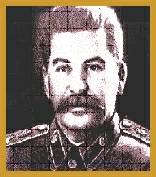|
PinkMonkey Online Study Guide-World History
However Kerenskyís new coalition Government soon grew unpopular.
At the same time, the masses became attracted towards the Bolsheviks,
whom they regarded as the true champions of the revolution. The
Bolsheviks became the majority party in most of the Soviets by October
2. They formed the Military Revolutionary Committee under Leon Trotsky.
Under this committee, the Red Guards were organized and commissars
were procured to take charge of the Petrograd army units. Thus the
complete allegiance of the Petrograd troops was secured.
On October 25, the Winter Palace, where the Provisional
Government was in session under armed protection, was attacked by
the Red Guards. All the ministers were arrested and killed. Since
the October revolution was a deliberately planned coup díétat
by Lenin and the Bolshevik controlled Petrograd Soviet, Lenin
is rightly considered to be the Father of the Bolshevik Revolution.
According to the Constitution published and adopted
on July 10, 1918, Russia was named as the Russian Socialist Federated
Soviet Republic. While the Constitution of 1918 guaranteed certain
basic rights to the exploited people, it also imposed some basic
obligations on them. In 1922, the All-Russian Congress of Soviets
created the Union of Soviet Socialist Republic.
In 1921, Lenin introduced the New Economic Policy
(N.E.P) which was a blend of state socialism and state capitalism.
After Leninís death in 1924, there was a keen struggle
between his lieutenants Leon Trotsky and Joseph Stalin, for taking
his place. Stalin was successful in establishing his dictatorship
in the party, as well as in the country.

Exhibit 12.4
Joseph Stalin
Joseph Stalin then inaugurated an era of Five-Year
plans in order to convert the weak, agrarian Russian economy
into a powerful and stable industrial economy. He also attempted
to get rid of the Kulaks, by mechanization and the collectivization
of all the farms. Thus the First Five-Year Plan in 1928, the Second
Five-Year Plan in 1933, and the Third Five-Year Plan in 1938, helped
Stalin to realize his objectives completely. Owing to these Five-Year
plans, the Soviet Union became the second most highly industrialized
country by 1940. The Revolution also enabled the Soviet Union
to emerge from World War II as the second super power; the first
being the U.S.A. In 1936, Stalin gave a new constitution to the
U.S.S.R, which provided for such features as a secret ballot and
universal adult franchise.
|
Index
12.0 - Introduction
12.1 Causes of theRussian Revolution
12.2 The Course of the Russian Revolution
12.3 Consequences and Significance of the Russian Revolution
12.4 Dates & Events
12.5 Points to Remember
Chapter 13
|